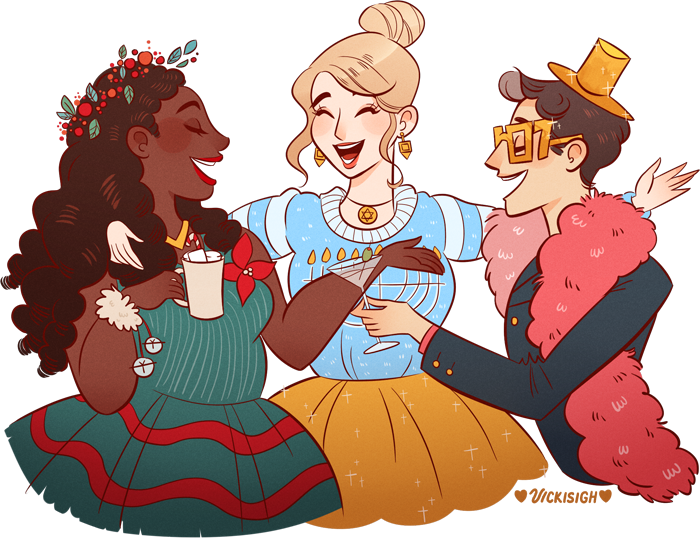
‘Tis The Season: Authors Talk Holidays is a special seasonal feature on Pop! Goes The Reader in which some of my favourite authors help me to celebrate the spirit of the season and spread a little holiday cheer. So, pour yourself a cup of hot chocolate and snuggle in by the fireside as they answer the question: “What does the holiday season mean to you?” You can find a complete list of the participants and their scheduled guest post dates Here!


About McKelle George
McKelle George is the author of a young adult historical retelling of Shakespeare’s Much Ado About Nothing, set in Prohibition-era New York, called Speak Easy, Speak Love, and a member of SCWBI. When not editing or writing, she works as an associate at the Salt Lake City Public Library. She is a traveler and nomad, an exclusively self-pleasing artist, lover of quiet adventures, banned book and library advocate. She currently lives in a downtown studio apartment in SLC with a giant white german shepherd.
The Cathedral of the Madeleine, the oldest Catholic cathedral in Salt Lake City, is just below my house. Right next to it is the First Presbyterian Church, which is the oldest Protestant building. I hear bells and hymns from both throughout the week, and I pass them on my walk to work at the library. I also pass through the soul of downtown (at least in December): the lights on Temple Square.
Here are some pictures I took on the way to work today:
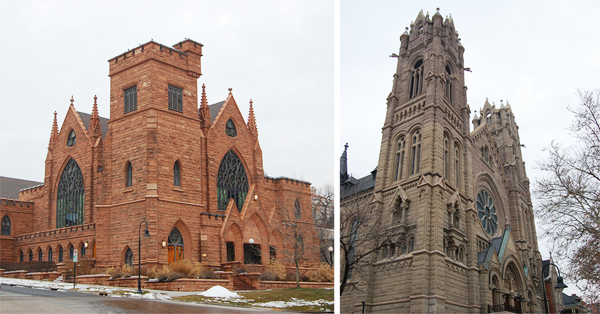
All of which is to say that I love where I live, first of all — and also I live in a highly Christianized place. Growing up, Christmas was steeped in worship. When I was a kid, going to visit the lights was magical, and the temple looked like an enchanted castle.
And it is pretty magical looking. I always volunteer to play host if a friend is passing through and hasn’t seen them.

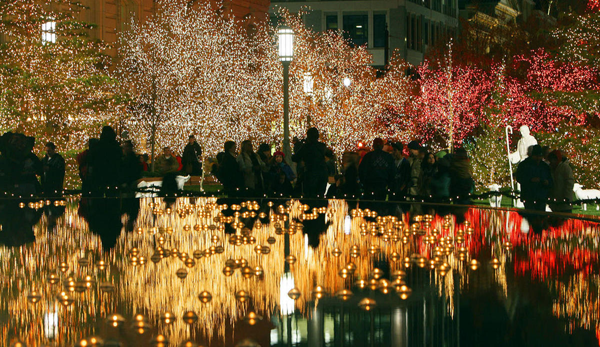
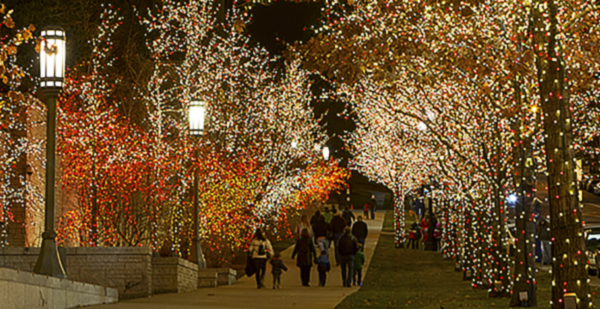
It’s dark when I get back from work, and most evenings, I pull out my headphones when I get to this block and take the long way through instead of my usual power-walk cut through the middle. Even as a retired Christian (as I sometimes refer to myself), I’m aware of how privileged I am that the rest of America accepts my personal culture out of hand. It doesn’t occur to me to feel awkward when every public space I enter is playing Christmas music with names like: O Holy Night, Angels We Have Heard on High, and O Come All Ye Faithful.
At a time when others are being actively discriminated against for non-Christian beliefs, this feels unbearably lucky.
Knowing I’d be writing this post, yesterday on my walk through, I made a special detour to the part of Temple Square dedicated to other cultures. It’s still Christian — but there’s a display of Nativity scenes made by Christian artisans in other parts of the world. There’s a Swahili set, a Hispanic set. One from the island of Tonga. Music plays on loud-speakers in other languages. All around the walkways in this area, plus the stone surrounding the fountains and sculptures, are both metal and fabric luminaries. The fabric luminaries look like the lanterns in Tangled, and are hand stenciled by volunteers who use wood-burning tools to inscribe messages on the fabric. The bags represent a wide variety of languages, each with words like “Peace,” “Joy” and sometimes “Merry Christmas.”
I was looking for the Hungarian luminary.
There are literally hundreds of luminaries, metal and fabric alike, but I found it almost immediately. Years ago, one of the most memorable Christmases I had was in a Hungarian city, doing service for my church.
If you can imagine Leslie Knope as a missionary, that was me. I was intense (and sometimes deluded; it’s fiiine). Have you ever seen the musical The Book of Mormon? My experience was absolutely nothing like that, but the little black tags were the same. So. Picturing a young Leslie Knope with a black nametag, ready to DO SOME GOOD on Christmas if it killed her? You are picturing twenty-one-year-old me.
Because I actually couldn’t find anyone who needed help (or rather, wanted to be bothered by a small pack of American kids over the holidays), I resorted to literally looking up service in the yellow pages. I found a shelter for the Deaf, Blind, and Disabled and called them to find out if we could visit.
The bewildered receptionist said yes, gave me their visiting hours, and I hauled myself, a Samoan-American girl who’d been in the country only a few weeks, and two white boys: one from Idaho, one from California. We brought pictures and cookies and handknit scarves and off we went to dispense cheer.
To say the IDŐSEK HÁZA was run down is an understatement. A holdover from the Iron Curtain area, it was poorly lit, old, and under-maintained. The rooms looked like they belonged in a Stephen King book about retired mental asylums. The first lady I visited had arranged a make-shift shrine to the Virgin Mary and rosary beads hung off the white-iron bed frame. “I’m Calvinist,” the woman explained, not apologetically. Her name was Éva, my favorite Hungarian name.
She didn’t sit up. A large diaper concealed her bottom half; one vein-covered leg stuck out from the blanket.
“That’s a beautiful necklace,” I told her, nodding toward the plastic medallion around her neck. The chain was made of glittery blue beads. “I can get you one,” she replied. (She did; mine had transparent gold beads, and a plastic medallion on the end with a sticker of the Virgin Mary on one side and Christ’s crucifixion on the other. A tiny glitter cross hung beneath Christ’s feet. I wore it for a week, before my bag strap accidentally broke the string, then I kept the medallion and what beads I managed to save in a plastic baggie.)
As she urged me to come back next week and questioned what colors I liked, a cockroach slightly smaller than my thumb, dark against the yellowing sheets, emerged from beneath her. I drew in a sharp breath, throat thickening with nausea, and then it disappeared the same way it came.
When it resurfaced minutes later, I reached down and grabbed it, threw it to the ground and squashed it under the heel of my black shoe. Éva didn’t notice, continued talking. My hand shook, hundreds of invisible insect legs still on my fingers.
“Dude,” the Californian boy came up behind me. “That was savage.”
Things didn’t get much better, and I began to feel uncomfortable showing them pictures of my home, of my family. My privileged life. My Leslie Knope was turning into Sister Aloysius when she says, “I have doubts! I have such doubts!” I most definitely did not feel like mentioning the word God or saying anything remotely along the lines of praying for them.
Eventually, I came to a room with a man by himself. “Szervusz,” I said, a bit tired. Instead of showing him my family, I asked about his. He stared at me, then his face crumpled. The pain in his expression was so sudden, watching it felt intrusive.
“They’re all gone,” he whispered, “I’m alone.” And then, as if this were the first time he’d remembered, his back hunched and quiet sobs shook his shoulders. His trembling hand sought the bed post, trying to find an anchor.
Stunned, I slipped my fingers under his and squeezed, guiding him back to the bed.
“I’m alone,” he repeated.
“I’m so sorry,” I whispered, wishing I had something better to say. I kept hold of his hand until he straightened and gazed at me with clear eyes, like the memory had gone and would only pain him further when someone (like me) reminded him again.
“Can I read to you?” I blurted. My comfort zone — then and now — was books. “I like to read out loud to practice my Hungarian.”
He nodded. I removed a book of poetry from my bag, one I had chanced upon in a bookstore. It was a bilingual edition of Attila Jozsef’s poems; one page written magyarul and the other in English. Attila Jozsef was the Edgar Allan Poe of Hungary, so not all of his work was cheering, exactly, but I chose titles like “Spring” and “Mother” (though that one turned out to be depressing after all), until I found a poem called “Lullaby.”
It was seven stanzas long, and the last line of each stanza was the same. Aludj el szépen, kis Balázs. It means: Go to sleep softly, little Balázs. The poem was written by Jozsef for the young son of a composer friend.
The sky is letting its blue eyes close;
The house its many eyes closes, too.
The quilted meadow lies in a doze:
Go to sleep softly, little Balázs
As I read the last line, András’ voice blended with mine. I stopped and looked at him. He said the words again. “Aludj el szépen, kis Balázs.”
“Do you know the poem?” I asked, pleasantly surprised. He didn’t answer, but every time I got to the last line, he murmured it with me. Aludj el szépen, kis Balázs.
It didn’t feel American or Hungarian. Christian, atheist, or otherwise. It just felt human. Go to sleep softly. And a little like a gift.
I think about that moment a lot, especially this time of year. It’s why I make a point of looking for the Hungarian luminary, and doing my own version of a prayer: “Aludj el szépen, kis Balázs.” This year, it displays the word: örvendezzünk.
Rejoice.
The way the grammar is, it’s an invitation. But interestingly, it doesn’t use the plural you, or even they. It uses the pronoun we.
Let’s rejoice, you and I.
As humans, of all different cultures, races, and religions — in respecting each other, and celebrating each other, and being kind to each other.


Title Speak Easy, Speak Love
Author McKelle George
Pages N/A
Intended Target Audience Young Adult
Genre & Keywords Historical Fiction, Retelling
To Be Published Fall 2017 by Greenwillow Books
Find It On Goodreads
Seventeen year-old Beatrice is hoping to trade the rules at St. Mary’s Society for Wayward Girls and Fallen Young Women for a quiet place to study for medical college. Instead she finds her uncle Leo and cousin Hero have transformed the basement of their Victorian mansion into the aforementioned gin joint and jazz club. Even more surprising is the other tenants she meets at the Hey Nonny Nonny – there’s a rum-runner named Prince and his Mafioso brother John, jazz dreamer Maggie, a love-struck Claude, and of course, recent runaway Benedick Scott.
Beatrice thinks Benedick is nothing more than a rich boy slumming it with the speakeasy crowd, while Benedick thinks a know-it-all like Beatrice is sure to ruin the spirit of the only place he’s ever felt at home. Beatrice and Benedick continue to squabble while helping Hero and Prince keep speakeasy alive, but when it’s clear that John’s increased presence in their humble joint isn’t just about Maggie’s singing career, they realize there’s more at stake than a good night of drinking.
Full of the well-intended misunderstandings, wit, and delicious twists that are hallmarks of a Shakespeare play, Speak Easy, Speak Love is a beguiling reinterpretation of Much Ado About Nothing, set against the ever-changing decadence of the Jazz Age.



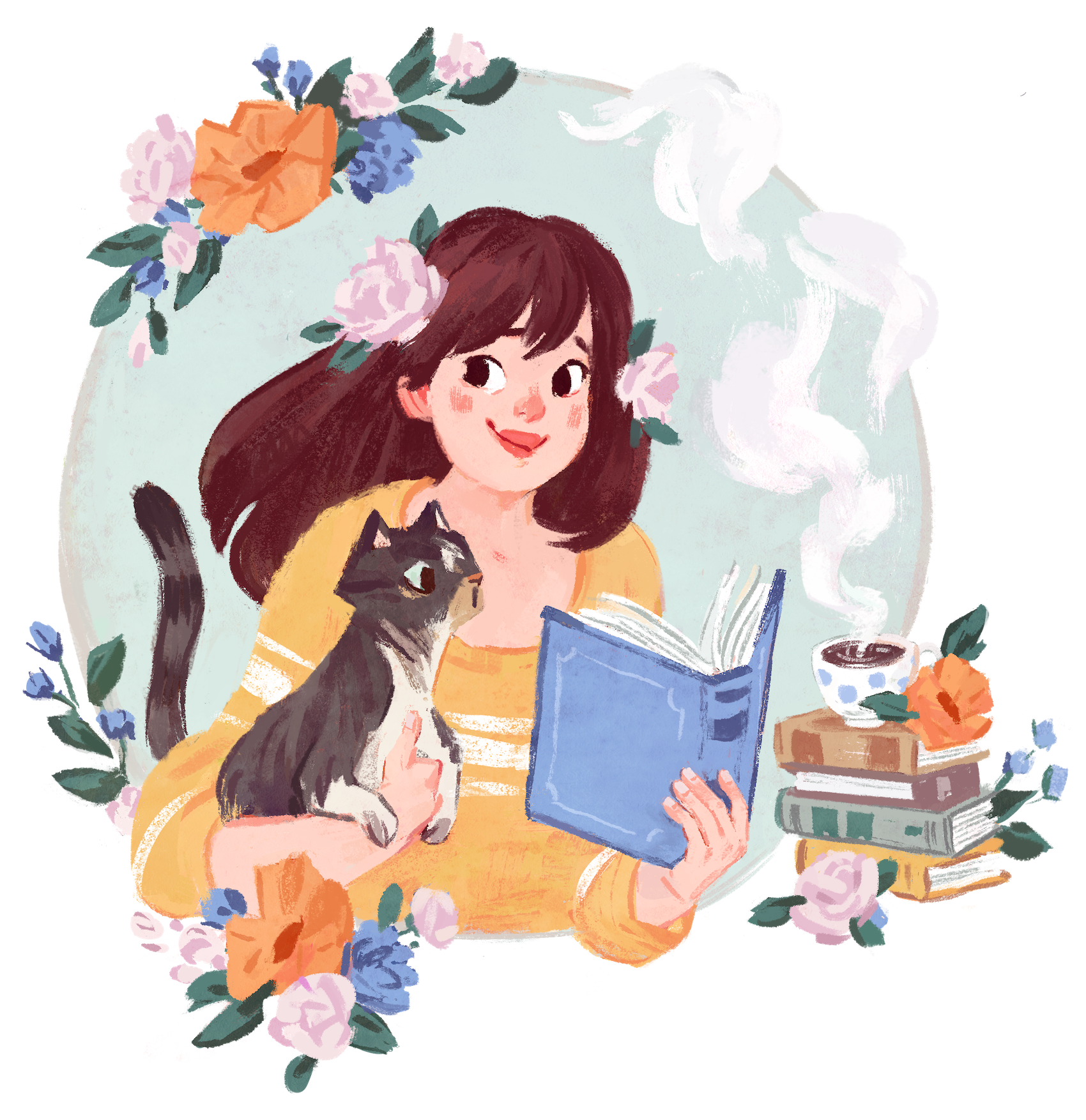
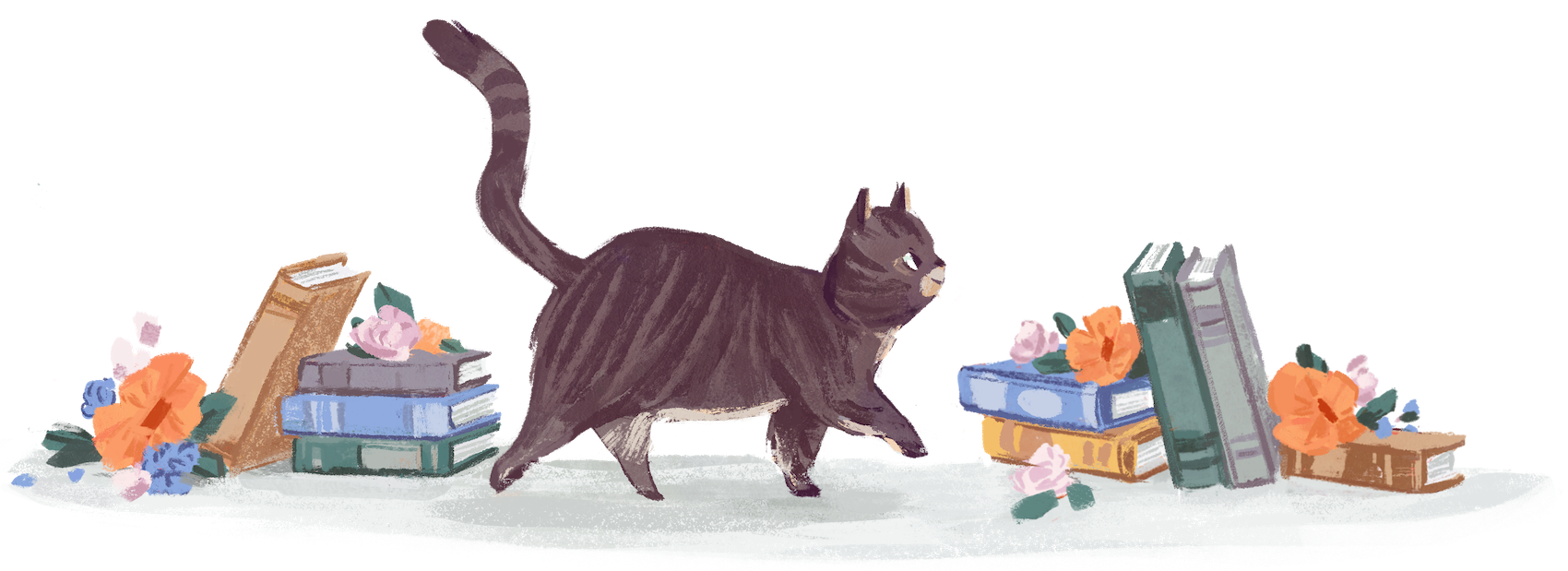
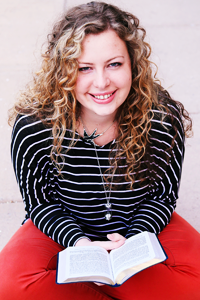


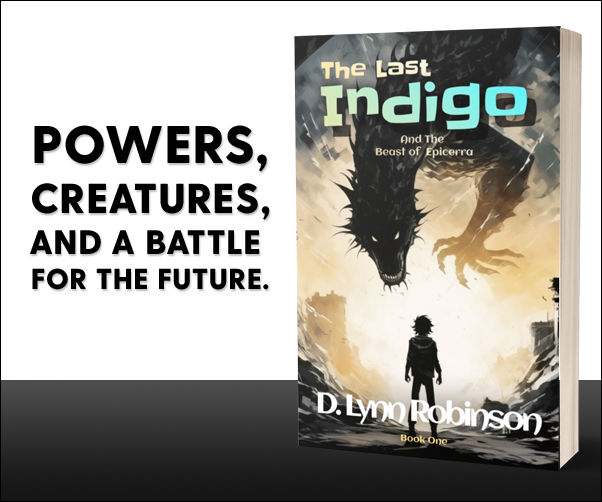

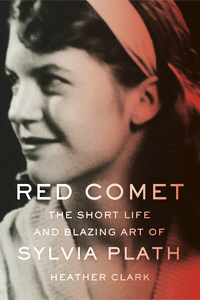


One Response
Beautiful story.